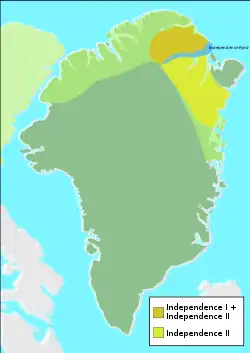
Independence II was a Paleo-Eskimo culture that flourished in northern and northeastern Greenland from around 700 to 80 BC, north and south of the Independence Fjord. The Independence II culture existed in roughly the same areas of Greenland as the Independence I culture, which became extinct six centuries before the beginning of Independence II.
Independence II is attested in northern Greenland by settlements on central Peary Land. There, it is estimated that the Independence II population was of no more than four to six families, and that it must therefore have been in contact with people of Ellesmere island in Canada or with people in north-eastern Greenland.[1]: 339
It has been argued that there is virtually no difference in the material cultures of Independence II and the contemporary Dorset culture in southern Greenland, locally known as Dorset I. Those who lump these two entities together refer to them jointly as Greenlandic Dorset.[2]: 737 Unlike Independence II, to the south, Dorset I persisted to at least AD 800.
Danish explorer Eigil Knuth first recognised the existence of Independence I and II.[3]
References
- ↑ Bjarne Grønnow; Jens Fog Jensen. The Northernmost Ruins of the Globe. Man and Society. Vol. 29. ISBN 87-90369-65-3.
- ↑ Jens Fog Jensen (2016). "Greenlandic Dorset". In Max Friesen; Owen Mason (eds.). The Oxford Handbook of the Prehistoric Arctic. doi:10.1093/oxfordhb/9780199766956.013.56.
- ↑ Dan Laursen, "Eigil Greve Knuth (1903-1996)", Arctic, University of Calgary, Dec 1006, Vol. 49, No. 4, pp. 401-403, accessed 13 Apr 2010
Further reading
- McGhee, Robert (1981). "The Independence II sites at Port Refuge, High Arctic Canada". Dorset Occupations in the Vicinity of Port Refuge, High Arctic Canada. Mercury Series. University of Ottawa Press. pp. 1–40. doi:10.2307/j.ctv16qmm.